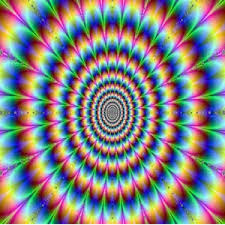
记忆方法
可以将“hallucinate”分解为“hallow”(意为空洞的)和“-inate”(动词后缀,意为使...)。想象一个空间变得空洞,人的视觉感知也随之空洞化,产生了幻觉。这样就能记住“hallucinate”表示产生幻觉的意思。
以上内容由AI生成, 仅供参考和借鉴
中文词源
hallucinate 产生幻觉,致幻
来自拉丁语alucinari,恍惚,出神,来自希腊语alaomai,漫游,流浪,来自PIE*al,走,漫游,词源同amble,exile.后17世纪英国医生Thomas Browne借用该拉丁词来指人产生的幻觉。
英语词源
- hallucinate (v.)
- "to have illusions," 1650s, from Latin alucinatus (later hallucinatus), past participle of alucinari "wander (in the mind), dream; talk unreasonably, ramble in thought," probably from Greek alyein, Attic halyein "wander in mind, be at a loss, be beside oneself (with grief, joy, perplexity), be distraught," also "wander about," which probably is related to alaomai "wander about" [Barnhart, Klein]. The Latin ending probably was influenced by vaticinari "to prophecy," also "to rave." Older in English in a rare and now obsolete transitive sense "deceive" (c. 1600); occasionally used 19c. in transitive sense "to cause hallucination." Related: Hallucinated; hallucinating.
权威例句
- 1. Hunger made him hallucinate.
- 饥饿使他产生了幻觉。
- 2. If you stared long enough and hard, you could even begin to hallucinate the appearance of small islands.
- 如果长时间目不转睛地盯着看,你甚至会产生幻觉,看到一些小岛的出现。
- 3. You again? Why couldn't I hallucinate someone who's not a moron?
- 你,又? 为什么我就不能幻觉出一个不是笨蛋的人?
- 4. Many college students in the 1960's took & quot ; acid & quot ; in order to hallucinate.
- 上个世纪六十年代的许多大学生为了产生幻觉而使用 麦角 酸二乙基酰胺.
- 5. Drug addicts often hallucinate.
- 吸毒成瘾的人常常产生幻觉.